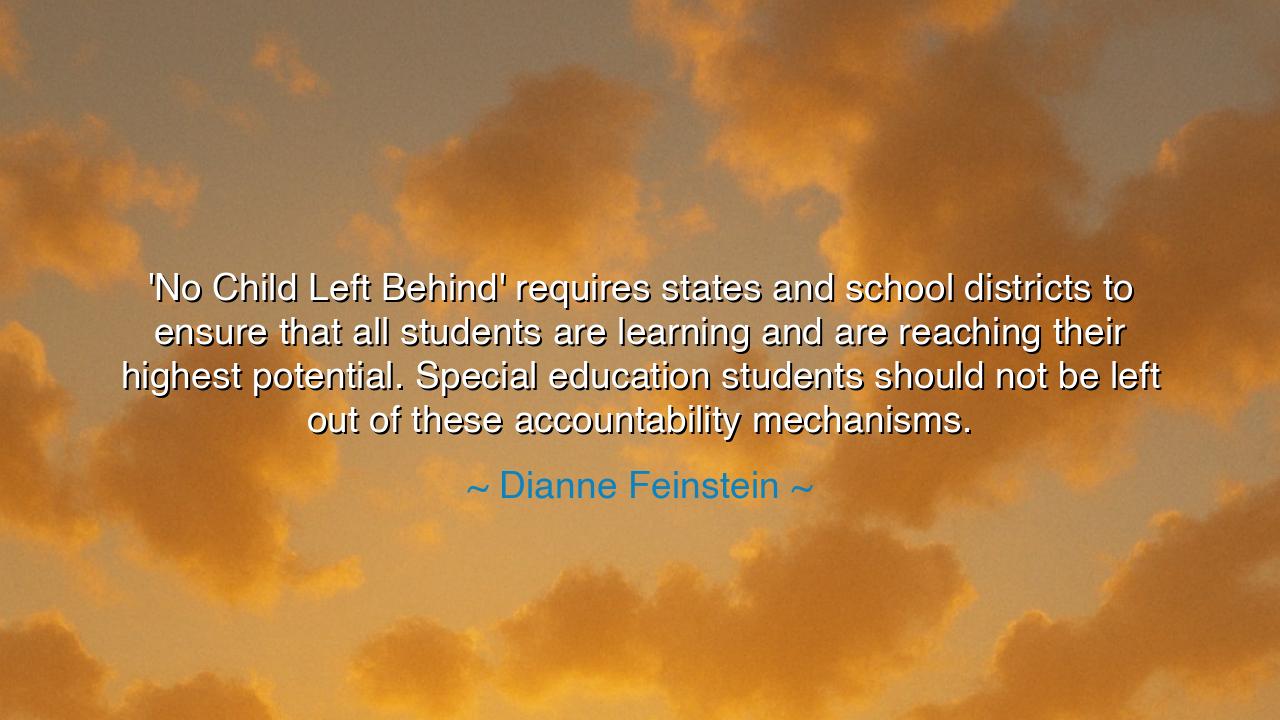
'No Child Left Behind' requires states and school districts to
'No Child Left Behind' requires states and school districts to ensure that all students are learning and are reaching their highest potential. Special education students should not be left out of these accountability mechanisms.






Hear, O guardians of the young, the words of Dianne Feinstein, who declared with firmness and compassion: “‘No Child Left Behind’ requires states and school districts to ensure that all students are learning and are reaching their highest potential. Special education students should not be left out of these accountability mechanisms.” In this saying, she reminds us that the measure of a nation’s greatness is not found in its wealth, its armies, or its monuments, but in how it treats the least visible and the most vulnerable among its children.
What is meant by No Child Left Behind? It was a law of the early twenty-first century, born of a noble, if imperfect, ambition: that every child in America, regardless of background, ability, or circumstance, should receive a quality education. It demanded that schools not only serve the brightest or the privileged, but also those who struggle, who need more time, more guidance, more care. Feinstein’s emphasis was that special education students—too often ignored, too often treated as an afterthought—must not be cast aside. For if they are left behind, then the promise of the law is broken, and the nation’s conscience is stained.
To exclude such children from accountability is to tell them their growth does not matter, that their futures are not worth measuring, that their potential is less sacred than others’. But Feinstein speaks as one who sees deeper: every child, no matter how differently they learn, carries within them gifts that can be developed. Some may learn slower, others faster; some with speech, others with signs; some with difficulty in books, but mastery in arts or crafts. To honor this diversity is to honor the image of humanity itself.
History gives us powerful examples. Consider Helen Keller, born blind and deaf, and thus locked away in silence and isolation. Without intervention, the world might have written her off as incapable. But through the teaching of Anne Sullivan, Helen’s brilliance emerged—her education transformed her into a writer, speaker, and advocate whose influence still echoes today. Her story reveals the heart of Feinstein’s words: if a child is given the tools to reach their highest potential, even against unimaginable odds, they can shape the world.
Feinstein also warns us of a danger: that in the pursuit of efficiency, schools may forget the individual. In a system driven by test scores and averages, the child with special needs can be quietly abandoned, because their progress may not raise the numbers. But to abandon them is not only a betrayal of them, it is a betrayal of all. For a society that refuses to lift up its weakest limb weakens its whole body. To leave one child behind is to weaken the strength of the nation.
The meaning of her quote is therefore both moral and practical. Morally, every child is sacred and worthy of the full measure of effort and love. Practically, when even those with the greatest obstacles are educated and uplifted, the entire society is enriched. A student once thought incapable may grow to design, to lead, to inspire. A classroom that embraces diversity trains all its children in compassion, patience, and justice. Thus the inclusion of special education is not a burden, but a blessing to the whole.
Therefore, O keepers of the future, let this be your charge: do not measure the worth of a child by ease of learning or conformity of mind. Support policies and practices that ensure no child, of any ability, is abandoned. Celebrate small victories as great ones, for in them lies courage and perseverance. Parents, teachers, citizens—be vigilant, for the first sign of neglect is silence, and silence is the shadow of injustice. Raise your voice, and raise your hand, so that every child may rise.
The final word is this: as Feinstein has spoken, so it must be remembered—education is a covenant, not for some, but for all. If even one child is left behind, the promise is broken. But if all are carried forward, each according to their capacity, then the nation is not only educated but ennobled. In lifting the least, we lift the whole, and in shaping every child, we shape the destiny of tomorrow.






AAdministratorAdministrator
Welcome, honored guests. Please leave a comment, we will respond soon